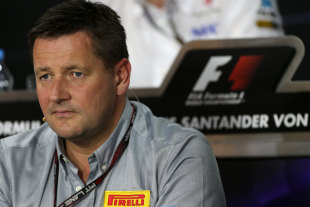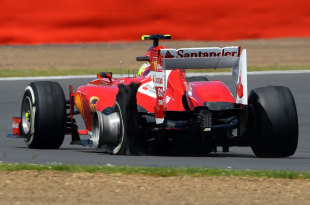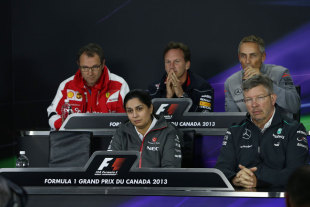- Paul Hembery exclusive Q&A Part One
'If the sport doesn't want to change they can find someone else'
Chris Medland July 18, 2013ESPN sits down with Pirelli's Paul Hembery to find out just how Pirelli is coping with its problems this season and how recent developments affect its plans for the future

- Feature:
-
'We're not quitters'
- News:
-
Pirelli toughens stance with F1
It's been a pretty tough few weeks, how tough has it been both in your position and for the company as a whole trying to put out all the fires?
It's been a strange season from many points of view. Getting caught up almost in a battle between the teams, and that's a reflection of the regulations which mean in-season if we're making changes that are non-safety then we have to get all of the teams to agree. That's something that ended up with seven teams wanting one thing and four the other, and that wasn't enjoyable because when we're trying to solve the delamination issue - which was tough to understand at the start because we thought it was a heat issue and then it became clear it was a damage issue - once we'd understood that then we could put it right. We were able to simulate it and we did, so then we thought everything was going to be OK and we get to Silverstone of course.
At Silverstone we'd underestimated the performance improvements in the cars - two or three seconds a lap is huge in any sport terms - we'd allowed the teams to swap tyres right to left on the rear, and as the tyre has got a directional sense to one of the components that created a point of force on the tyre when it was rotated that meant with the loadings at Silverstone - which is now the highest load track we've got, that's how much it's changed this year - it created a weakness and the problems we saw.
The first job obviously was to understand what happened and whilst you're seeing images you don't understand what's happened. We needed to understand that quickly and it came through quite quickly on Monday morning when we had the tyres in the lab and we had a chance to analyse it. So then we had to press a button to make some changes for Germany, we knew that we had a race coming up. Whilst probably in any sense we would have been quite happy racing with the 2013 tyre, common sense tells you that it was also prudent that we made a change as well to demonstrate that we had reacted. So that's what we did, we had to work miracles to get some tyres made from Turkey, get them shipped in and it was a fantastic job by our team over in Turkey at Izmit.
Step two of the changes will be to go back to the 2012 structure which we used for a couple of years without issue, and the reason for that is we've still got places like Spa and Suzuka to come which are also high load tracks. As we're in a little bit of a moving target situation in that we don't know what the teams can come up with and how far they can go it was again felt it was the right thing to do at this stage to introduce that as early as possible to give an extra margin when we get to those really tough tracks again.
You mention how quickly you had to get those changes made, can you put in to context how tough that was both logistically and financially?
I'm quite sure when everything comes out it will run in to well over €1million, I'm quite sure of that. I haven't counted it; I don't want to count it yet because I've got to sign it off yet, but you're looking at that sort of sum of money.

When that kind of bill gets passed up to the top of the tree, what's their reaction? Are they annoyed with Formula One for pushing for changes?
No, it's a change we needed to make so there's pragmatism from that point of view that these are things we needed to do. It's part of our job to do those things, it's part of the money you need to invest sometimes when you need to react to situations. So that's not an issue. As things pass on, there's still from our point of view a very significant and notable issue in terms of how the sport approaches their tyre maker and I don't mean just ourselves; if someone else comes in you're going to have the same problem. We've only ever done one test - the famous Mercedes test - with a current car in three years.
You say it's something that needs rectifying, do you feel that all the problems you've faced this season have been Formula One's own making or perhaps a result of the FIA's governance of the sport?
I'm not going to criticise the FIA because I don't think it's necessarily their issue. We were working better with the teams. The teams in the first year were quite a lot better at working together and we've seen that dissipate over the last two and a half years. That's not just with us, I think there's lots of things going on there behind the scenes with new agreements - the Concorde Agreement - and things like that, some teams struggling, so there's a lot more friction between the teams than we've seen before. Whilst individually we have fantastic support from all of them, collectively it's not quite there. We know going forward that a lot of things have to change and that's something that we need to have fixed because we can't be in a situation like this again.
We need to be able to test in the right conditions; people say to me 'well go on a simulator'. What if we went and worked on one simulator rather than another? It would be like favouring a team again so that's not always the easiest thing to do. Also things like wet testing and testing at high-speed circuits like Silverstone where we did see some issues of the kerbs having an impact on the sides of the tyres. We've got images of the tyres with cuts on that we don't know really where they came from - whether they were kerbs or something else - but they were there, and that had nothing to do with the main issue that we saw.
We also want to make sure that there are procedures in place to monitor some of the parameters of the use of the tyre. Be that the way that pressures are set, pressures when cars get behind safety cars when you restart, camber levels, so there's a whole series of little pieces that on their own might not seem significant but when you put them together they're very important. So that's something that we're going to try and work to get changed.
For example, at the moment we have no real indication what the 2014 cars are going to be like and in a couple of months we're meant to be all ready to go. I guess it's not in the teams' briefs to understand what our problems are or our needs are. In the past when previous suppliers have been in they had a few years of tyre competition so you do more in one week of tyre testing than we've done in three years. That creates a lot of knowledge and a lot of background which we've not been able to do. As I say we've only really performed a proper tyre test - when you've been running 14/15 specifications, short runs, long runs - we've only done it once with a current car in three years and that's simply not good enough.

There's been no announcement yet on a new contract but are these now conditions/clauses/sticking points?
They're things that have to change, we couldn't possibly risk putting ourselves in that situation again. There's no doubt it has to change. If the sport doesn't want to change then they can find someone else. We want to stay obviously but we need to make some changes, we can't just keep talking about it, things now have to change. There's other points of view; talking with drivers you say 'Aren't you concerned about going in to 2014 without ever doing any wet testing? You're going to have almost a vertical torque curve and all this power and you're going to go probably to Malaysia and have your first wet race, is that alright? How do you feel about that?' It's a bit strange. It's not like the current cars that are an evolution; this is a big change and it will change the way you drive. You don't really want to be in a race situation where it suddenly rains mid-race and you've got to drive for the first time in the rain. Certainly with the amount of rain we get at some races around the world I think that would be remiss.
So are these things you still haven't got agreements on?
No they're being discussed - I've got a big letter here at the moment! (For Bernie Ecclestone and Jean Todt)
There are certain deadlines that you have said about getting contracts in place that seem to keep passing…
Well we're working forward for next year. Time is passing on. I mean, we don't need to do Formula One to survive as a business; it's a part of the company. In November we might be packing up and going and then it's somebody else's problem, but we've made every effort we can to get things sorted. We haven't given any deadlines, we're just working on; maybe we're silly doing that, maybe we should have insisted on things being sorted. It's mid-July (laughs) and I if somebody wants to come in and take over I think they would be very brave, because the issues we've been suffering with would be issues that any company would have problems with, quite frankly.
Chris Medland is assistant editor at ESPNF1
© ESPN Sports Media Ltd.
 Chris Medland is assistant editor at ESPNF1 Chris Medland, who in his youth even found the Pacific GPs entertaining, talked his way in to work at the British Grand Prix and was somehow retained for three years. He also worked on the BBC's F1 output prior to becoming assistant editor ahead of the 2011 season
Chris Medland is assistant editor at ESPNF1 Chris Medland, who in his youth even found the Pacific GPs entertaining, talked his way in to work at the British Grand Prix and was somehow retained for three years. He also worked on the BBC's F1 output prior to becoming assistant editor ahead of the 2011 season

